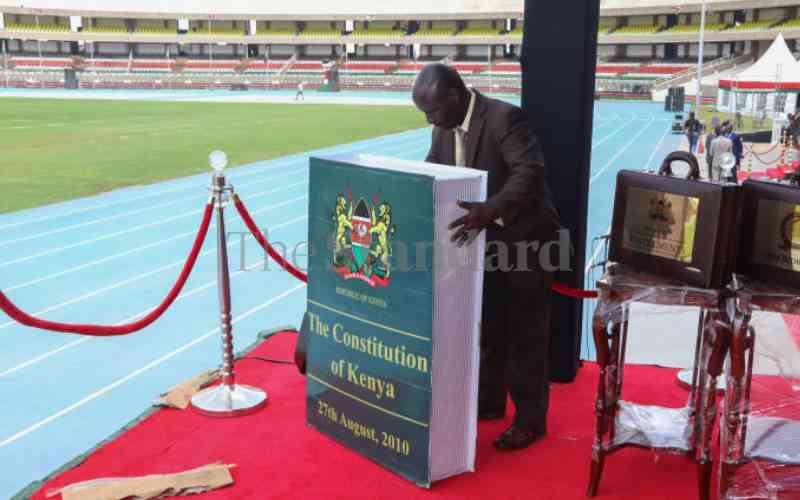Allow me to continue discussion on the released Building Bridges Initiative (BBI) report, even as Kenyans internalize the proposals therein. Today I will debunk some theories that have so far been vigorously articulated by its opposers, while next week, I will analyse the challenges that those who support the BBI constitutional amendments will have to contend with.
Last week, I discussed the “imperial Presidency” and “capture of the judiciary” arguments. Today, I challenge three other positions. The first one sounds very inspired and makes a reasonably legitimate argument; we did not need the BBI for government to do all the things being provided in the report. The President could have ensured a more inclusive government and did not need a constitutionally founded expansion of the executive to ensure inclusion.
The allocations to counties could have been raised to the proposed 35% without any constitutional amendment. Gender equity was possible without BBI. And on and on the arguments go.
Truthfully, government could have carried out these progressive acts without any constitutional changes. There are however two challenges to this argument. Firstly, while that is true of several proposed amendments, there are critical alterations which could not have been implemented without constitutional amendments.
One is the creation of the Prime Minister and Deputies and their inclusion in both Parliament and the Executive. This was the primary focus of the BBI and was necessitated by the need to widen the current executive pyramid which is very thin at the top to include more representation across regions.
Kenya’s politics is still regional; a polite way of saying ethnic. For now, people like to see their regional chieftain in the team at the top. Arguments to the contrary are theories by bench analysts who have not been involved in real politics.
Another alteration that was impossible without constitutional amendment was the elevation of the runner up in the Presidential election to the office of the Leader of the Opposition, a major cause of post-election strife.
But more fundamentally, there has never been an argument that governments can’t do all the progressive things that constitutions require them to do, without the necessity of law. Governments don’t need law to respect human rights. They don’t need law to ensure democratic elections. They need no constitution to ensure equity. And yet we provide all these issues in constitutions to force governments to do right. I have no doubt that many pro-people proposals in the BBI were not from the goodness of heart of its promoters but were a necessary balm to ensure its passage without being defined as an elite document.
Assuming that this is true, government is binding itself to do what it needs to do. As a citizen I am comfortable to support any progressive proposal from government, whatever the motives of its origins. The second falsity to debunk is that Parliament is now captured by the Executive because Ministers will be in the House. That argument misses one essential point. Ministers are still capped at 22. Only about 11 of those will come from Parliament. The rest will be ex officio, presumably with no voting powers. The House has 360 members. Even if the entire 22 Ministers were voting MPs, they would be a small minority in the House and can hardly be the instrument for presidential takeover of Parliament. The final point is the argument that government cannot afford to allocate 35 per cent revenue to county governments seeing as it has been reluctant to release even the 15 per cent provided in the current constitution. The promoters of this argument have statistics that show that once we pay debt and other non-discretionary expenses, there is no more money.
This argument loses me. Firstly, any citizen must celebrate the opportunity to constitutionally seal that annual drama of counties demanding more money.
Secondly, it is up to the executive to determine where the money for counties will come from once it is a constitutional requirement. We know that all it takes is trimming the top. In any case that cannot be our concern; let the national government cut its coat with the cloth it will have. As I have said before, BBI has some challenges. However, many of the arguments being bandied about have zero merit.
-The writer is and advocate of the High Court of Kenya
 The Standard Group Plc is a
multi-media organization with investments in media platforms spanning newspaper
print operations, television, radio broadcasting, digital and online services. The
Standard Group is recognized as a leading multi-media house in Kenya with a key
influence in matters of national and international interest.
The Standard Group Plc is a
multi-media organization with investments in media platforms spanning newspaper
print operations, television, radio broadcasting, digital and online services. The
Standard Group is recognized as a leading multi-media house in Kenya with a key
influence in matters of national and international interest.
 The Standard Group Plc is a
multi-media organization with investments in media platforms spanning newspaper
print operations, television, radio broadcasting, digital and online services. The
Standard Group is recognized as a leading multi-media house in Kenya with a key
influence in matters of national and international interest.
The Standard Group Plc is a
multi-media organization with investments in media platforms spanning newspaper
print operations, television, radio broadcasting, digital and online services. The
Standard Group is recognized as a leading multi-media house in Kenya with a key
influence in matters of national and international interest.








